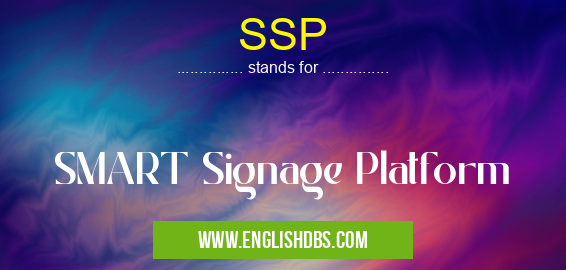What does SSP mean in UNCLASSIFIED
SSP stands for SMART Signage Platform. It is a comprehensive software solution that enables businesses to manage and control digital signage systems efficiently. SSP provides a centralized platform for creating, distributing, and scheduling content across multiple digital displays.

SSP meaning in Unclassified in Miscellaneous
SSP mostly used in an acronym Unclassified in Category Miscellaneous that means SMART Signage Platform
Shorthand: SSP,
Full Form: SMART Signage Platform
For more information of "SMART Signage Platform", see the section below.
Introduction: Understanding SSP
Key Features of SSP
- Content Management: Create and manage a wide range of digital content, including images, videos, text, and HTML5 web pages.
- Scheduling and Playback: Schedule content to be displayed on specific displays at designated times and durations.
- Display Control: Remotely control and monitor connected displays, adjusting brightness, volume, and other settings.
- Remote Monitoring: Monitor the status of displays and content in real-time, ensuring continuous operation.
Benefits of Using an SSP
- Centralized Control: Manage multiple digital signage systems from a single platform.
- Improved Content Management: Create and deliver dynamic, engaging content to enhance customer engagement.
- Enhanced Efficiency: Automate content scheduling and playback, freeing up staff time.
- Increased Flexibility: Easily update and change content on the fly, responding quickly to changing needs.
- Cost Savings: Reduce hardware and maintenance costs by centralizing digital signage management.
Essential Questions and Answers on SMART Signage Platform in "MISCELLANEOUS»UNFILED"
What is SSP (SMART Signage Platform)?
SSP is a cloud-based platform that allows users to remotely manage and distribute digital signage content. It provides a centralized platform for creating, scheduling, and deploying content to various display devices, including TVs, kiosks, and video walls.
What are the benefits of using SSP?
SSP offers several benefits, including:
- Centralized content management: Create, schedule, and manage content from a single platform.
- Remote device management: Monitor and control display devices remotely, ensuring optimal performance.
- Content distribution: Distribute content to multiple devices simultaneously, simplifying content deployment.
- Analytics and reporting: Track content performance and gather insights to optimize campaigns.
What types of content can be managed with SSP?
SSP supports a wide range of content formats, including images, videos, HTML, and live streams. It allows users to create interactive content, such as polls, surveys, and social media feeds.
Who can use SSP?
SSP is suitable for businesses and organizations of all sizes that use digital signage for marketing, communication, or information display purposes. It is particularly beneficial for industries such as retail, hospitality, education, and healthcare.
What devices are compatible with SSP?
SSP is compatible with a wide range of display devices, including TVs, kiosks, video walls, and touchscreens. It supports various operating systems and hardware platforms.
How secure is SSP?
SSP employs robust security measures to protect user data and content. Access to the platform is controlled through user authentication and role-based permissions. Data is encrypted during transmission and storage.
Final Words: SSP is an essential tool for businesses looking to enhance their digital signage capabilities. By providing a centralized platform for content creation, scheduling, and display control, SSP empowers businesses to effectively engage their target audience and maximize the impact of their digital signage systems. Its user-friendly interface and comprehensive features make it an ideal solution for a wide range of applications, from retail and hospitality to corporate and educational settings.
SSP also stands for: |
|
| All stands for SSP |
